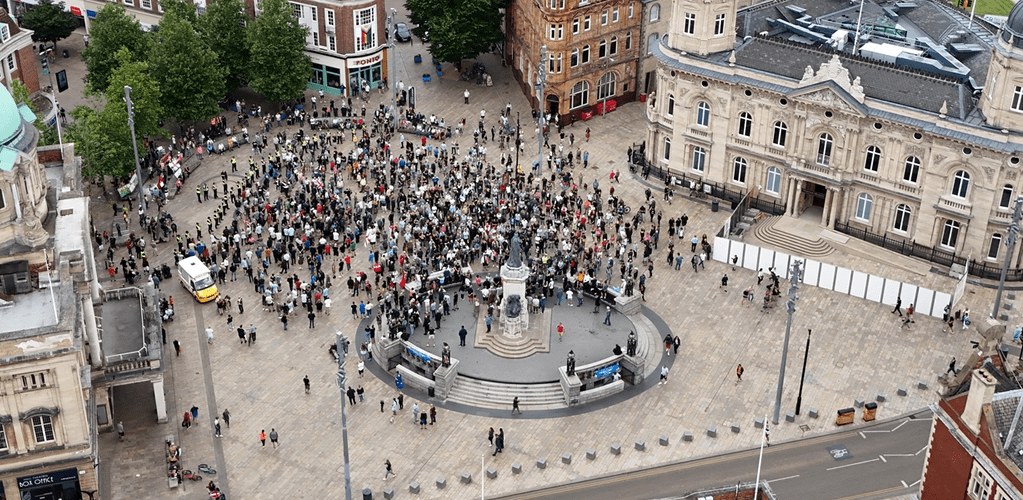English nationalism’s fascist problem
The ongoing far-right violence in England, misrepresented as a British issue, underscores the nation’s struggle with English nationalism and identity. Media and political narratives often avoid this root cause, exacerbating tensions.

TL;DR | Highlights from this story
● Media coverage of the far-right violence in England is often mislabeled as a broader UK issue.
● The violence largely takes place in England, targeting minority groups and fueled by far-right nationalism.
● Political figures and media outlets have contributed to the rise of this violence through divisive rhetoric.
● England’s identity crisis and nostalgia for its imperial past are driving factors behind the unrest.
T here’s a striking feature of the media’s coverage of the outbreak of far-right violence which has overtaken much of England in recent days. For the most part it is being presented as a British issue when it is, in fact, an English one.
The Sunday Times has the headline “Riots engulf Britain” while The Mail on Sunday has the front page banner “Tinderbox Britain”. Both the BBC and Sky News seem to have a similar difficulty using the word England.
Even STV carried the story under the headline, riots across the country. There have been no riots in this country, ‘Scottish’ TV. The BBC is casting the whole sickening mess as a ‘UK’ problem… while filming packs of knuckle-draggers singing ‘England ’til I die’.
However, aside from a single protest in Belfast organised by the usual far-right Loyalist Orange bigots, where they were heavily outnumbered by anti-fascist protestors, all these outbreaks of rioting violence, and civil disturbances have taken place in England, and are being perpetrated by far-right goons chanting “We want our country back” while waving English flags. It’s clear that the country they want “back” is England, and they want it “back” from anyone who isn’t English.
Mosques have been targeted in Belfast, Hartlepool, Liverpool, Merseyside, Middlesbrough, Newcastle, Sunderland, and Stockton. So, pro-Palestine marches were hate marches? Where is Suella Braverman now? Where are those who emboldened and empowered this?
Let’s be honest, these aren’t protests, they’re pogroms. The rioters set fire to a hotel in Rotherham believed to be housing asylum seekers and then blocked the exits. Blocking the doors of a burning hotel is attempted murder. Starmer campaigned on the nonsensical claim that the last government had ‘lost control of our borders’. He should take his share of responsibility for legitimising what led to this as must GB News, the out-of-control right-wing press, Reform UK, the Tories, and the BBC, and an out-of-control social media controlled by sociopathic billionaires.
This should be our Dunblane moment. Only with social media, not guns. Elon Musk is fanning the flames of hatred. No individual, and certainly not a person as damaged and irresponsible as Musk, should have so much control over what information or misinformation gets into the public sphere. Musk gave the worst people in the British far-right a platform for their division and hate. He legitimised them with interaction, and now his actions have born violent fruit; he claims civil war is inevitable here. He’s the arsonist warning there’s going to be a fire.
But Britain’s main political parties are responsible too. Who could have guessed that a general election where both main parties competed with each other to see which could be most anti-migrant would shortly afterwards be followed by race riots? It’s difficult for Starmer to counter systemic Islamophobia when it was part of his own election narrative. Has anyone asked Starmer how “Reclaim the flag” is going?
Keir Starmer made a statement on Sunday flanked by two flags, the same flag that the fascists are brandishing, talk about a lack of self-awareness: “I won’t shy away from calling it what it is, far-right thuggery.” He said as he shied away from calling it what it is. English nationalist racist fascism. This is a monster of his and the Tories’ and the British establishment’s creation.
In 2011 Nigel Farage condemned “opportunistic” rioters who had “nothing to do with any political reason” and called for the army on the streets. He’s changed his tune now it’s the far-right opportunistically rioting in 2024, assaulting and attacking anyone who’s not white and English.
If we are going to solve this problem, the first step is to be clear about what it is. This is a problem of English nationalism and it is a crisis of English nationalism similar to that which gave us Brexit. Like Brexit, these riots are the result of an English delusion, a crisis of identity resulting from a failure to come to terms with the loss of empire and the end of its own exceptionalism.
In Scotland, this chaos is supported and lauded only by sectarian bigots, hard-core unionist knuckle draggers, the kind who drape themselves in British flags and whom the Scottish media is wont to describe as Scotland’s shame, when what they represent is in fact a diseased manifestation of the exact same Anglo-British nationalism which is currently causing so much civil disorder in England. In England, it can, of course, nakedly and proudly present itself as English. In Scotland, it becomes mutated and distorted through the prism of “I’m a proud Scot but…” into a twisted celebration of the Cringe. But it’s a manifestation of English nationalism nevertheless and a resentful anger against anyone who rejects the subordinate status of Scotland as an adjunct to Greater England.
The root cause is England and English nationalism. However, much of the proud Scot buts scream that it’s anti-English racism to point that out.
England was once the centre of a huge empire, arguably the world’s first and greatest global superpower. The proud Scot buts love to tell us that Scots were enthusiastic participants in that empire, and that is unquestionably true, but it was an empire which spread and fostered the English language and English culture around the world, not Scottish. Scots participated in that project by assimilating to English cultural norms. There was never any doubt about who was the dominant partner. It was the British Empire not the Scottish Empire, at a time when British was a synonym for English, never a synonym for Scottish.
England has not come to terms with its loss of empire. These riots, like the campaign to leave the EU, are motivated by the fear of what is alien. Faced with the loss of its former power and influence, England is cast as the perennial victim, the target of Brussels bureaucrats, anti-English Scots, or Muslims supposedly trying to replace England from within.
The supporters of Brexit painted the EU as a lethal threat to English national identity a stranger and enemy who has already stolen it, so they chant “Give us back our country.” But since Brexit has manifestly failed to solve the problems of poverty and social exclusion felt by the English working class, indeed it never could, the cynical architects of Brexit have turned to another target. Muslims and immigrants, the “other” in the midst of England.
These riots, like Brexit, are the result of a specifically English psychosis, the narcissistic outcome of a specifically English crisis of identity.
Professor Nicolas Boyle of Cambridge University pointed out in an article in 2017 about Brexit, which is well worth a read:
“In the first phase [of England’s identity crisis], in the eighteenth century, the English gave up their Englishness in order to become British, the rulers of the British Empire; in the second phase, in the middle of the twentieth century, they lost even that surrogate for identity and have been wandering ever since through the imperial debris that litters their homeland, unable to say who they are.
“England sank its identity in the unions with Scotland, in 1707, and with Ireland, in 1800, which gave rise respectively to Britain and to the United Kingdom. From then on the English had no need of a separate identity, for as metropolitans, first of the United Kingdom and then of the British empire, they dealt with no one on equal terms. They were characterless, because they never met anybody who could impose a character on them: they were masters of the seas, they could travel round the world without setting foot outside imperial territory, and economically the empire was, potentially at least, self-sufficient.
“While Ireland, Wales, and Scotland became, for the English, slightly comic regions of ‘Britain’, ‘England’ became for them the sentimental ideal of ‘home’, the image of the green and pleasant mother-country that concealed the brutal realities of empire from its agents and possessed nothing so sordid as distinct political or economic interests of its own.”
Empire characterised and defined England for many generations. Its loss threw England back into being a middle-sized European country, uniquely ill-equipped to deal with the compromises, negotiation and cooperation that this new reality entailed. Instead we see the likes of Nigel Farage, explaining England’s loss of power in terms of victimhood, and the UK as the new expression of English exceptionalism.
Unless England can have that national conversation with itself, and can find some way of accepting the reality that it is a middle-sized European nation for which absolute sovereignty is an impossibility, then it will always be vulnerable to right-wing demagogues.
As long as Scotland remains a part of this unequal so-called union, Scotland too will be vulnerable to the English nationalist far-right. As we saw from Keir Starmer’s recent election victory, the right could potentially win an absolute majority in Westminster on as little as one-third of the popular vote. Then Scotland will feel the full blast of right-wing English nationalist resentment, and we in Scotland will be dragged down with it.







[Read our Comments Guidelines]